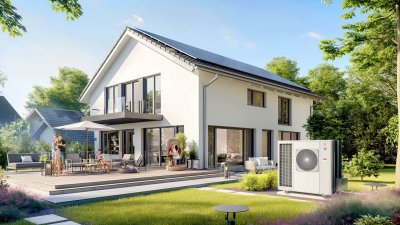Energy costs can be reduced and living comfort increased with intelligent heating systems. Smart thermostats and networked heating systems enable precise control of the room temperature and help homeowners save money in the long term. How does smart heating control work? Smart heating systems automatically adapt to the habits of the residents. With the help of sensors and...
Energy efficiency
Rising energy costs and the desire for greater independence from electricity providers make photovoltaic systems an attractive investment for many property owners. But when is the installation really worthwhile and what are the benefits for owners? Cost savings through own solar power A photovoltaic system enables homeowners to generate a large proportion of their own...
Roofs play a central role in the energy efficiency of buildings. Modern roof constructions and innovative insulation materials offer enormous potential for reducing energy consumption and increasing living comfort. This article shows how owners can save costs in the long term and increase the value of their property through targeted roof renovations. Thermal insulation - the be-all and end-allA...
In view of rising energy prices and stricter climate targets, the energy-efficient refurbishment of properties is becoming increasingly important. But which measures are really worthwhile and how high is the savings potential? In this article, we take a detailed look at the benefits of energy-efficient renovations and provide practical tips for owners. Why energy-efficient refurbishment...
With rising energy prices and new legal requirements, the choice of the right heating system is becoming increasingly important. But which heating technology will be the best choice for property owners in 2025? In this article, we compare the most common systems in terms of cost, efficiency and environmental friendliness. Heat pumps: sustainable and efficientHeat pumps are considered to be particularly...
Today, even listed buildings can often be equipped with photovoltaic systems. New regulations in several federal states allow a more liberal approval practice for solar systems on listed buildings. Owners of historic buildings now have the opportunity to use solar energy to cut electricity costs and reduce CO₂ emissions without significantly altering the appearance of the building.
In Germany, the building sector accounts for around 30 percent of energy consumption and CO2 emissions. A large proportion of the approximately 15 million detached and semi-detached houses are outdated in terms of energy efficiency. However, modern insulation and efficient heating systems based on renewable energies can significantly reduce energy consumption and increase living comfort at the same time. Refurbishment actively contributes to...
Almost a third of property owners in Germany would only carry out energy-efficient renovations if they were legally obliged to do so. This is the result of a study by ING-Direktbank. Despite the potential to increase property values and rents through such improvements, there is great reluctance. This hesitation is partly due to the confusion and uncertainty...
The concept of urban mining is becoming increasingly important in the construction industry. It enables the reuse of materials from demolition projects. The targeted recycling of building materials produces valuable secondary raw materials that can be used in new construction projects. The aim is to reduce dependence on new, often scarce raw materials. The procedure includes the...
Property owners face high costs when they want to renovate their properties to make them more energy efficient. However, modernization can significantly reduce energy costs and increase the value of the property. There are various subsidy programs to alleviate this financial burden. Owners must first apply for the subsidies before the D. Investments may usually only be made after the...










